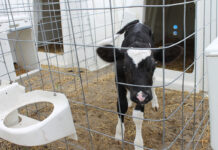COLUMBUS — Roughly five months into the state’s new fertilizer certification program, farmers and nutrient applicators are taking advantage of early training opportunities.
Although they technically don’t have to be trained until Sept. 30, 2017, more than 1,200 people have already been trained.
Matt Beal, chief of the Ohio Department of Agriculture’s Division of Plant Health, gave an update on the program during the annual Ohio AgriBusiness Association conference, Feb. 4 in Columbus.
Getting farmers certified early has been a goal of various farm organizations, including Ohio Farm Bureau, due to ongoing issues with nutrient runoff and harmful algae.
John Schlichter, ODA deputy director, said the ag industry is doing a good job of being proactive.
“I’m proud of the way our farmers and agribusinesses and associations have stepped up and done more than what is required of them to get us down the right path,” Schlichter said.
New requirement
The certification is a requirement for Ohio farmers who apply chemical fertilizer to more than 50 acres. There are certain exemptions, like applying fertilizer through a planter box.
Beal gave an overview of how the program works and the various exceptions.
Fertilizer, according to the legal definition, contains a “recognized plant nutrient element or compound,” which is used for its plant nutrient content, or for compounding mixed fertilizers.
This does not include lime, limestone, water or manure, unless mixed with fertilizer or distributed “with a guaranteed analysis.”
The process
If a person already holds a licensed pesticide applicator certification, they must still attend a two- to three-hour approved fertilizer certification program and complete an ODA form, but there is no additional cost if the pesticide license is maintained.
Those without pesticide certification need to complete the certification program, complete the form and application, and pay the $30 fee. If everything is correct, ODA then mails the producer a certification card.
Those who are certified crop advisors, or CLMs, are exempt from the training, but must contact ODA for their certification card. Another exemption is for nutrient applicators who are under the direct supervision of someone who is certified.
To be re-certified, producers need to attend two hours of approved training every three years.
Record keeping
A major portion of the new law involves record keeping. Producers will be required to record, within 24 hours of applying fertilizer, such things as the date of application, product analysis, rate, field, method used, weather forecast, etc.
Records must be kept for three years, and are required to be submitted to ODA only if the department requests them. Also, records can be kept electronically or on paper.
While the record keeping requirement does add a new level of responsibility, the kinds of records being asked for are ones farmers likely keep anyway.
“If you weren’t keeping those kind of records already, you’re not doing a good job for your clients or on your farm,” said Josh McGrath, a plant and soil sciences specialist at the University of Kentucky.
He told farmers to be honest with their records, and remember, good record keeping is a good defense if they’re ever challenged in court.
In addition to good record keeping, farmers can also use comprehensive nutrient management plans as an affirmative defense against nuisance complaints.
Well attended
More than 300 people attended the conference, which was the third of its kind.
Chris Jahn, president of The Fertilizer Institute, gave the keynote address during a dinner meeting, where he encouraged the ag industry to continue its effort to manage nutrients, and to achieve the voluntary 4R Nutrient Stewardship Certification.
“As is the case here in Ohio, many of the nutrient policy challenges we face today are watershed-specific,” said Jahn. “Getting it right requires a team effort.”
Related:
Ohio governor includes water quality goals in budget.
Senate moving ahead with water quality regulation.











